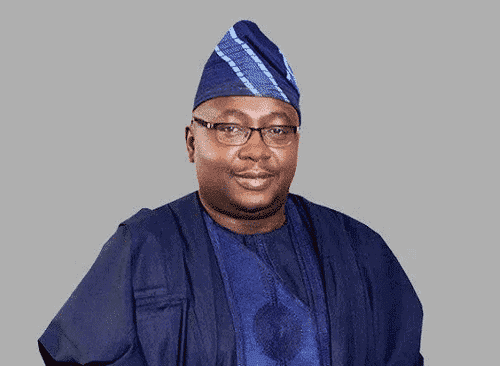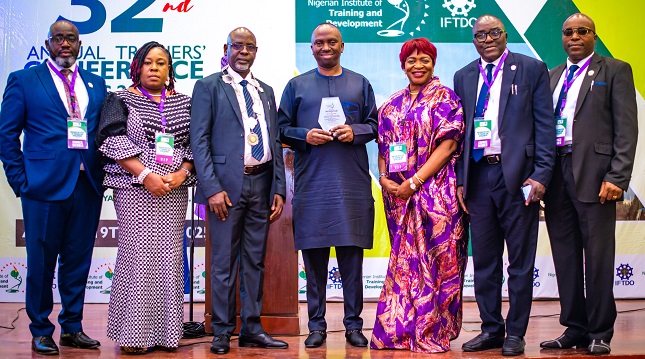News
PEF Saves N360Bn through e-Loading – Kasali

Mrs Adefunke Kasali, former executive secretary, Petroleum Equalisation Fund (PEF), said the agency saved more than two billion dollars (about N360 billion) through ‘Project Aquila’.
Kasali announced this while handing over duties to the new Executive Secretary, Mrs Asabe Ahmed in Abuja on Thursday.
Project Aquila is a high-tech electronic loading and delivery system introduced by PEF to check leakages as well as enthrone transparency and due process in the system.
According to her, PEF has been able to check fraudulent activities among petroleum marketers. “The initiative, also known as e-loading, ensures the delivery of petroleum products to the right destination.
“The process has checkmated annual loss of N15 billion to the activities of unscrupulous petroleum tanker drivers who engage in unethical activities such as diversion of some petroleum products,” she said.
Kasali added that the agency had taken a bold step to eliminate corruption and ensure prompt payment of bridging cost through Project Aquila.
“We have cleansed the entire system, we have cleansed the downstream system. We went from a manual system of operation where it took between 16 or 18 months before claim was paid to where we pay in two or four weeks.
“The system of giving out 10 or 15 per cent before you collect your cheque is gone. The Central Bank of Nigeria (CBN) gave us an award in 2013.
“We were the agency government understudied to direct all Federal Government agencies to commence e-payment because PEF did it and we have been recognised for it,” she said.
She added that through the initiative, PEF had detected and stopped payment of more than N847million in fictitious claims by petroleum marketers.
Kasali said the project had also been able to remove encumbrances such as late payment of bridging claims that caused distortions in the supply chain.
“Just look at the way we designed the business. We saved two billion dollars upfront because we wrote the codes
Kasali refuted claims that the board was underpaying some marketers or delaying their payments, saying that the PEFMB had been consistent in paying the right claims due to marketers.
This, she said, was in accordance with their capacity as approved by the Department of Petroleum Resources. “Those who are complaining are those the robust Project Aquila has blocked their old ways of milking the system and are uncomfortable with the new measures imposed to check past abuses.
“If any marketer said he was not paid, it means we could not confirm that they were loaded. So, if somebody said his claim had been stocked, it meant that they were not loaded.”
Mrs Asabe Ahmed, new executive secretary, lauded the achievements of Kasali and said she was going to build on them. “I can see a team of highly motivated professionals, the efficiency I have seen in the system is due to all of you. I have come to carry on from where she has left off.
“Not a whole lot is going to change in terms of process that is already in place. I can only build on outstanding ones recommended for upgrading,” she said.
She, therefore, called for cooperation of the staff, stressing that the industry was a complex one that needed the cooperation of all the stakeholders.
News
Nigeria Taps $190M JICA Loan to Power Underserved Communities

Nigeria is seeking a $190 million renewable energy loan backed by the Japan International Cooperation Agency (JICA), according to Adebayo Adelabu, minister of power.

Minister Adebayo-Adelabu
In a statement released by the ministry on Saturday, Adelabu disclosed the plan during the 9th Tokyo International Conference on African Development (TICAD 9) in Yokohama, Japan, where the Nigerian delegation led by President Bola Tinubu held high-level discussions on power, infrastructure, and industrial transformation.
Adelabu said the facility is aimed at scaling distributed renewable energy solutions across underserved communities. “This builds on the recently launched $750 million World Bank Distributed Access through Renewable Energy Scale-up (DARES) programme under the Mission 300 Compact, which aims to bring clean and reliable electricity to more than 17 million Nigerians,” the ministry said.
The minister also held talks with Japanese corporations including Toshiba, Hitachi, Japan’s transmission and distribution corporation, and energy exchange corporations. Discussions focused on strengthening transmission infrastructure, improving operational efficiency, and cutting system losses.
The ministry said these engagements build on recent Federal Executive Council approvals for counterpart funding of N19.08 billion to unlock a $238 million loan from JICA. The loan will finance the expansion of the national grid, including the construction of over 200km of new 330kV and 132kV double circuit lines, six new substations, and extensions to existing facilities.
Three substations funded through a $32 million JICA grant—located in Apo (FCT), Keffi (Nasarawa), and Apapa (Lagos)—are also set for commissioning, a move expected to boost supply reliability for households, industries, and business hubs, including the Lagos Port.
Speaking during a panel session themed “HICKARE Africa: Harnessing Innovation, Co-creation, and Knowledge for Accessible and Resilient Energy for Africa”, Adelabu highlighted Nigeria’s energy gap, noting that only 55–60 percent of the population currently has access to electricity, much of which is unreliable.
He outlined the government’s approach to expand grid access in urban areas while accelerating off-grid solutions such as solar mini-grids and standalone systems in rural and peri-urban communities. He pointed to challenges including limited access to affordable capital, high costs for rural households, and the under-utilisation of productive-use equipment.
Despite these hurdles, the minister reaffirmed the government’s commitment to reforms through supportive policies, private-sector collaboration, and increased local manufacturing of renewable energy components.
Adelabu commended JICA and the Japanese government for their “long-standing support” to Nigeria’s power sector, praising their contributions to infrastructure, training, technical studies, and financing. He expressed optimism for deeper partnerships between both countries in driving Nigeria’s energy transition.
News
Banigbe, T2 CEO says Nigeria’s Growth Hinges on Learning, Innovation, and Afrocentric Content

Obafemi Banigbe, chief executive officer of T2, has stressed that Nigeria’s long-term economic transformation depends on continuous upskilling, digital learning, and workforce adaptability.

Speaking as Special Guest at the 32nd Annual Trainers’ Conference (ATC 2025) of the Nigerian Institute of Training and Development (NITAD), held recently at the Shehu Musa Yar’Adua Centre, Abuja, Banigbe warned that without deliberate investment in human capital and technology-driven innovation, the nation risks lagging behind in a rapidly evolving global economy.
Drawing from personal reflections, practical insights, and a forward-looking vision, Banigbe urged Nigerians to reimagine approaches to learning, work, and growth in order to build a prosperous, inclusive, and innovation-led society.
He emphasized that the traditional model of “learning once and working forever” is obsolete.
“With Nigeria projected to become the world’s third most populous nation by 2050, and 70 percent of its citizens under 30, the need for continuous upskilling, digital learning, and adaptability is not optional, it is existential,” he stated.
Banigbe underscored the importance of democratizing access to digital tools, ensuring that every Nigerian child has the same opportunities as peers in developed economies.
He called for the creation of Afrocentric educational content, including culturally relevant cartoons, to help children learn science, mathematics, and history through familiar cultural references rather than foreign identities that disconnect them from their environment.
He also urged a national shift away from a culture that prizes certificates and training hours to one that rewards competence, innovation, and problem-solving.
He envisioned a civil service and workforce driven by solutions rather than processes, stressing that while artificial intelligence may analyze and automate, it cannot dream, uphold ethics, or create new nations, a reminder of the enduring human advantage.
Banigbe further encouraged adoption of cost-effective training models such as online platforms, virtual cohorts, and open-source learning, while acknowledging the continued value of global exposure where local resources fall short.
During an interactive question and answer session, he addressed concerns around affordability, accessibility, and the role of self-driven digital education in shaping Nigeria’s future-ready workforce.
He assured participants that T2 itself is on a path of transformation, committed to delivering world-class services as a proudly Nigerian brand.
In recognition of his contribution to national dialogue and thought leadership, the President of NITAD, James Bulus, presented Banigbe with an Award of Excellence.
News
NACCIMA, TETFund Forge Alliance to Boost Innovation, Skills, Economic Growth

The Nigerian Association of Chambers of Commerce, Industry, Mines and Agriculture (NACCIMA) and the Tertiary Education Trust Fund (TETFund) have agreed to a new strategic partnership aimed at driving innovation, entrepreneurship, and workforce readiness.

Led by its National President and Chairman of the Organized Private Sector of Nigeria (OPSN), Engr. Jani Ibrahim, a high-level NACCIMA delegation visited the TETFund headquarters in Abuja today.
The team was received by the Executive Secretary of TETFund, Arc. Sonny S.T. Echono, during what both parties described as a milestone engagement.
Discussions during the meeting focused on collaborative initiatives including entrepreneurship development, support for the green economy, commercialization of academic research, industry–academia synergy, and skills development to better equip graduates for the evolving demands of the labour market.
A key outcome of the meeting was the mutual agreement to sign a Memorandum of Understanding (MoU) and establish a NACCIMA–TETFund Joint Technical Committee that will oversee the implementation of agreed initiatives.
Both sides also expressed commitment to developing additional partnership frameworks that will bolster Nigeria’s competitiveness and economic resilience.
Also present at the engagement, Prof. Umar Bindir lauded the collaboration, highlighting the need for structured, long-term partnerships between academia and the private sector to generate practical solutions to Nigeria’s socio-economic challenges.
Arc. Echono, in his remarks, praised NACCIMA’s leadership in promoting enterprise and innovation, and reaffirmed TETFund’s readiness to work closely with the Organized Private Sector to foster research, innovation, and economic transformation.
This collaboration positions NACCIMA as a key driver of national development, helping to bridge the gap between education, enterprise, and policymaking, while empowering young Nigerians and strengthening the foundation of the country’s knowledge economy.

 E-Financial2 days ago
E-Financial2 days agoFBNQuest Merchant Bank Facilitates Landmark ₦5Bn Commercial Paper Programme for Accion Microfinance Bank

 E-Business2 days ago
E-Business2 days agoNDPC Begins Probe of Banks, Others for Data Breaches

 Telecom2 days ago
Telecom2 days agoDigital Realty Commits to Africa’s Digital Transformation @ Launch of LKK2 Data Center

 Telecom2 days ago
Telecom2 days agoIntel–U.S. Partnership Reshapes Semiconductor Landscape with Historic Equity Agreement

 E-Financial2 days ago
E-Financial2 days agoUBA to Deepen Financial Inclusion, Boost Savings’ Culture with Super Savers’ Promo

 Telecom2 days ago
Telecom2 days agoNITDA Alerts Nigerians to eSIM Security Flaw Deployed to Hijack Devices Worldwide

 E-Financial2 days ago
E-Financial2 days agoNigeria Leads Africa in Stablecoin Adoption with $22Bn in Transactions

 E-Financial2 days ago
E-Financial2 days agoFidelity Bank Resumes Intl Transactions on Naira Debit Cards

















